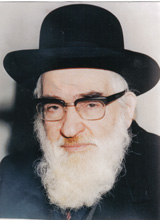The Torah study is dedicatedin the memory of
Yaakov Ben Behora
3518
It must be stressed, however, that it is not the mere incantation of the formula that brings forgiveness. Rather, it is the incorporation of these attributes of mercy into our personalities that guarantees God's mercy. As the Talmud states: "Whenever Israel sins, let them do before me this order, and I will forgive them (ibid.)." The emphasis is on the doing, not the saying. We become deserving of mercy when we are merciful; deserving of compassion, when compassionate.
Moses' response in Shemot 34:9 to the revelation of the thirteen attributes was two-fold. First, he asked of God that the Divine Presence never depart from the midst of the Jewish people. Secondly, he asked for forgiveness for our sins. Ramban understands that there was also a third request, namely, that Eretz Yisrael be granted to the Jewish people (U'nechaltanu - "and grant us our inheritance" = Eretz Yisrael).
The merit of imitating God's ways of lovingkindness and mercy will grant us three wonderful gifts: 1) God will be in our midst, 2) our sins will be forgiven, and 3) we will be privileged to inherit the Land of Israel.
--------------------------
This is a weekly column contributed by Aloh Naaleh an organization devoted to motivating Jews to make Aliya.
Aloh Na'aleh
POB 4337, Jerusalem 91042
Tel: 972-2-566-1181 ext. 320 ~ Fax: 972-2-566-1186
Email: aloh-naaleh@aaci.org.il

Pirkei Avot between Pesach and Shavuot
Rabbi Berel Wein | 5769

5. Weddings and Engagements during the Omer Period
Chapter 3: Customs of Mourning during the Omer Period
Rabbi Eliezer Melamed | Tishrei 30 5782

What Is the Significance of the Number 40 in Jewish Tradition?
Rabbi Stewart Weiss | Tevet 4 5782





